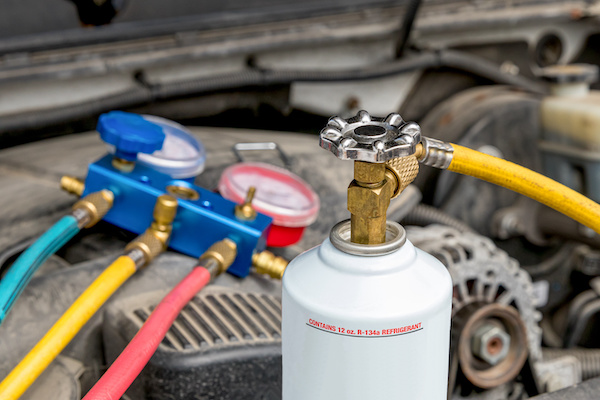Posted on 4/30/2023

As summer is right around the corner, you need to make sure your car's air conditioning is ready to keep you cool on hot days. The refrigerant is one of the most critical parts of your car's A/C system, and it would simply not feel cool without it. Different types of refrigerants are used in car A/C systems, and you should know which one your vehicle requires. Below is a complete list of auto A/C refrigerants: R-12: R-12 is an old refrigerant that was used in car A/C systems before the 1990s. It's a chlorofluorocarbon (CFC) that has been phased out due to its harmful environmental effects. It's no longer available, and if your car still uses an R-12, you'll need to convert it to a new refrigerant. R-134a: R-134a is today's most common refrigerant used in car A/C systems. It's a hydrofluorocarbon (HFC) that doesn't harm the ozone layer. R-134a is a more efficient refrigerant than R-12 and is also less expensive. If you ... read more
Posted on 3/30/2023

Maintaining your vehicle is essential to keep it running safely and efficiently. Regular maintenance not only prevents breakdowns and repairs but also prolongs the life of your car. However, many people need help determining how much to budget for vehicle maintenance. Here's what you need to know: Estimate Your Annual Mileage The first step in determining your vehicle maintenance budget is to estimate your annual mileage. The more you drive, the more maintenance your vehicle will need. A good rule of thumb is to set aside $0.05 to $0.10 per mile for maintenance costs. Consider Your Vehicle's Age Older vehicles typically require more maintenance than newer ones. The older your car is, the more you should budget for repairs and maintenance. A general guideline is to budget $500 to $1,000 per year for a vehicle that is five years old or older. Account for Regular Maintenance Tasks Routine maintenance tasks like oil changes, tune-ups, and brake inspections should be performed o ... read more
Posted on 2/28/2023

As an essential component of your vehicle's powertrain, the transmission is in charge of transferring power from the engine to the wheels. It's a complex system that requires proper maintenance to keep it running smoothly, and one of the most critical aspects of transmission care is changing the fluid regularly. So, how often should you change your transmission fluid? The answer depends on a few things, such as the make and model of your car, the type of transmission you have, and how you use your vehicle. Most car manufacturers recommend changing the transmission fluid every 30,000 to 60,000 miles. However, some high-performance vehicles or those used for heavy-duty purposes may require more frequent fluid services. It's best to consult your owner's manual or a professional technician to determine the ideal interval for your specific vehicle. Ignoring your transmission fluid can lead to serious problems down the road. Over time, the fluid can become contaminated wit ... read more
Posted on 1/30/2023

The reason behind a comfortable and smooth drive is your vehicle's suspension. It is essentially four springs on each wheel that absorb all bumps and potholes on the road. Different types exist - from smooth and high from the ground to stiff and low, depending on the specifications of the car. The bad thing is that there aren't a lot of customizations after it leaves the factory or, in other words, you get what you pay for and nothing more. If you are looking for adjustability, aftermarket suspension kits have plenty of options from which to choose. Here you will find some of them and what they do differently from the factory ones. What Does “Aftermarket” Mean? Let's start with the meaning of the term aftermarket. It refers to brands and components not made or supervised by the original manufacturer. Aftermarket parts are used for repairs or upgrades because of the possibilities they offer. Air Suspension Air suspension systems work by lifting the chase from ... read more
Posted on 12/30/2022
.jpeg)
The topic of vehicle maintenance is a precarious one. Everyone has an opinion on which is the best vehicle maintenance schedule. Unfortunately, most have their merits but make it difficult to choose which vehicle maintenance schedule to follow. The following are the vehicle maintenance factors to consider to choose the schedule to follow: Miles Over Time The most popular vehicle maintenance schedule says you should take your car in for service every 30,000 miles. However, the amount of time a car takes to cover that distance depends on its usage. The fact is that cars will undergo different types and levels of damage even when they travel the same distance or for the same period. Vehicle components will also experience varying wear and tear levels. It is hence vital to come up with a conservative estimate of the distance necessary for routine maintenance. The mechanic will also help you come up with one. Warranty Most vehicles have a warranty which determines how often you shoul ... read more